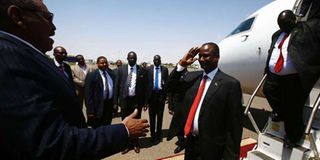S. Sudan’s new vice-president visits Khartoum

Sudan's First Vice-President Bakri Hassan Saleh (left) welcomes his South Sudan counterpart Taban Deng Gai upon his arrival at Khartoum International Airport on August 21, 2016 for an official two-day visit. PHOTO | ASHRAF SHAZLY | AFP
What you need to know:
- The spokesman for Sudan's Ministry of Foreign Affairs, Gharib Allah Khidir, says South Sudan's first Vice-President Taban Deng will meet Sudan's President Omar Al-Bashir and First Vice-President Bakri Hassan Saleh.
- He says that meetings will discuss bilateral relations between the two neighbours and the latest development in South Sudan.
KHARTOUM, Sunday
South Sudan First Vice-President Taban Deng arrived in Khartoum today for a two-day visit.
He was received by his Sudanese counterpart Bakri Hassan Saleh.
Talking to the Nation, the spokesman for Sudan's Ministry of Foreign Affairs, Gharib Allah Khidir, said that Mr Deng will meet Sudan's President Omar Al-Bashir and First Vice-President Saleh.
He further explained that the meetings will discuss the bilateral relations between the two neighbours in addition to the latest development in South Sudan.
Mr Deng’s first visit to Sudan as vice-president comes weeks after he replaced rebel leader Riek Machar following clashes in Juba that left hundreds dead in July.
“We have received Taban Deng as the first vice-president of South Sudan,” Sudan’s Minister of State for Foreign Affairs Kamal Ismail told reporters at Khartoum airport. While Khartoum has recognised Mr Deng as South Sudan’s vice-president, east Africa’s eight-nation trading and security bloc IGAD, of which Sudan is a member, has yet to formally acknowledge his appointment.
Mr Deng headed straight for meetings with senior Sudanese officials, and he is due to meet President Omar al-Bashir on Monday.
“During his official visit, he will hold talks on several bilateral and regional issues,” Ismail said.
Mr Deng is accompanied by South Sudan’s defence and energy ministers as well as senior intelligence officials from Juba.
After a 1983-2005 civil war, the mainly Christian south of Sudan split from the Muslim north on July 9, 2011, following a referendum six months earlier.
Armed revolts on both sides of the border, however, have soured relations between their two governments.
Key issues include the status of the Khartoum-occupied border district of Abyei and Juba’s payments for the use of an oil export pipeline through Sudan.
In June, the South Sudan ministers of foreign affairs, oil and the interior also held talks in Khartoum on oil and border issues. South Sudan’s oil production has virtually ground to a halt since a civil war erupted there in December 2013, when President Salva Kiir accused Machar of plotting a coup.
Machar was later dismissed and replaced by Mr Deng on July 25. On Thursday, an aide to Machar said he had escaped to the Democratic Republic of Congo.
Last week, Sudan announced that it will contribute troops to keep the peace in its troubled neighbour South Sudan.
Mid last week, a delegation of Transitional Government of South Sudan officials led by First Vice-President Taban Deng Gai was in Kenya on a mission seeking a bailout.
This publication has learnt that Juba will also be reaching out to Uganda later this month to craft a bailout package that will see Kampala pay traders the $35.2 million Juba owes them in a bid to have them resume supplies to the country. “The vice president will go to Kampala to request the Ugandan government to pay traders who supplied cereals to Juba but haven’t been paid.
‘‘The money will then be converted into a loan, for which Juba and Kampala officials will work out a repayment plan,” a diplomatic source with the knowledge of the matter said.
The delegation to Nairobi, which included four ministers, met with President Uhuru Kenyatta, Cabinet Secretary for Foreign Affairs Amina Mohamed.




